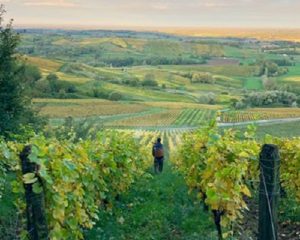
As we approach the lunar calendar celebration known as Mid-Autumn Festival in Chinese-speaking countries, also celebrated under the names Chuseok in Korea and Tsukimi in Japan, we delve into some of our favourite wines produced following the lunar calendar aka biodynamic wines.
Celebrating the moon
‘Mid-Autumn Festival’ is also known as the Moon Festival. ‘Tsukimi’ means ‘Moon Viewing’ and ‘Chuseok’ means ‘Autumn evening’. In Hong Kong, China, Korea and Japan, this celebration falls on the 15th day of the 8th lunar calendar month. Due to discrepancies between this calendar and the Gregorian one, the date of the celebration varies each year. This year, it falls on 6th October.
The tradition is believed to date back to more than 3000 years ago, as a way of giving thanks to the gods and the moon in celebration of the year’s harvest, that would have ended around that time of year for most common crops.
Lunar Calendars and Biodynamics
The traditional Chinese Lunar Calendar is a lunisolar calendar, which means it integrates the movement of the moon as well as that of the sun. It is also called “agricultural calendar” in Chinese. This calendar comprises of 24 solar terms, based on the sun’s position in the zodiac. It was used by farmers in ancient China to guide their agricultural work.
As wine lovers contemplating the Chinese “agricultural calendar”, we cannot help but think of another astral related calendar that also has agriculture at its heart: the one followed when using biodynamic farming practices.
Just like farmers in ancient China had done thousands of years before her, Maria Thun studied the impact that the sun and moon as well as the Earth’s position had on plant growth. Having been intrigued by Rudolph Steiner’s theories on agriculture and biodynamic cultivation, she started to experiment, methodically planting radishes daily in the 1950s. She discovered the influence that the position of the planets and moon had on plant growth. From her experiments, a lunar calendar or ‘sowing calendar’ was created. It is divided into four different types of days, during which, depending on the moon and the sun’s position to the zodiac constellations, the plant will favour either its roots, leaves, flowers or fruit. These are known as Root Days, Leaf Days, Flower Days, Fruit Days.
Sometimes coined ‘esotericism’ by its detractors or ‘common sense farming’ by its supporters, working in harmony with cosmic rhythms is the core of biodynamic agriculture.
While the scientific debate on the influence of the moon and the stars on plants is still ongoing, renowned winemaking estates such as Domaine de la Romanée-Conti, Château Pontet-Canet and Château Latour have now long been integrating biodynamic principles and following of the lunar calendar when tending to their vines. They cite the aim to reveal the terroir, protect the environment and preserve the fertility of the soils as some of their reasons for doing so.
Biodynamic practices in French Winemaking
It is this philosophy that has led some winegrowers from all corners of France (and the world) to adopt biodynamic farming practices with a holistic and ecological approach, although some have been following it for quite some time already.
That is the case of Domaine Huet, established by Gaston Huet in Vouvray back in 1928. He was joined by Noel Pinguet in 1976, who took over the management of the vineyard and introduced biodynamics to the vines as early as 1989. The two men shared the same ideals of absolute respect of the terroir and its purest expression. Noel Pinguet later became one of the great figures of biodynamic viticulture in France.
Clos des Vignes du Maynes is a historical estate in the Maconnais where vines have been grown since the 10th century and also known as the oldest organic estate in Burgundy. The aim here has always been to look after the soil with the greatest respect. Organic principles were introduced in the 1950s and this tradition continued when biodynamics were introduced in the 90s by the youngest generation. As stated on the estate’s website, “The objective of biodynamics principles is to accompany the plant growth throughout (the four different seasons of) the year by carrying out specific and adapted work: in autumn, it is the decomposition of organic matter; in spring, it is the remobilisation of this, then we guide the metamorphosis of these materials into sap, leaves, flowers and fruits. Our objective is to accompany these different stages with preparations such as horn dung, horsetail, silica, etc.”
Another producer to follow biodynamic principles as a natural transition in its winemaking process is Champagne Domaine Francis Boulard. In early the 2000s, Francis was inspired by biodynamic agriculture which reminds him of his grandparents farming vegetables and fruits in the past, always following the lunar calendar.
As Matthieu Barret from Domaine du Coulet puts it, “Biodynamic farming is, above all, about caring for the land. It’s about ensuring its balance and creating harmonious living conditions between the soil, plants, and environment.” It is with this mindset that Matthieu turned to biodynamic farming after taking over the 16-hectare family estate in Cornas, Crozes-Hermitage and Saint-Joseph in the early 2000s.
Biodynamic wines that you might want to try
- Domaine Huet’s 2023 Vouvray Le Mont Sec, a white with hints of flint and citrus aromas from the 8-hectare-parcel in the exceptional ‘Le Mont’ terroir, with clay and limestone soil which gives the Chenin Blanc good structure and acidity.
- Les Vignes du Maynes’ Mâcon-Cruzille Aragonite, leaving this white wine to age for 8 to 15 years before tasting allows it to fulfil its true aromatic potential.
- Les Vignes du Maynes’ Mâcon-Cruzille Manganite, one of Domaine des Vignes du Maynes’ most coveted red cuvées made from 70-year-old- Gamay Petits Grains vines on limestone soils. In the glass, this is a wine with delicate flavours you are unlikely to forget.
- Domaine du Coulet’s Cornas Gore, an elegant and complex wine from a small plot selection, produced in very small quantity.
- Domaine Francis Boulard’s Champagne Petraea IV Brut Nature, a Champagne matured using the Solera principle: each year, up to 50% of the previous year’s harvest is added to the blend. As a consequence, each wine is composed of a decreasing proportion of the preceding vintages. This started with the 2012 vintage.



